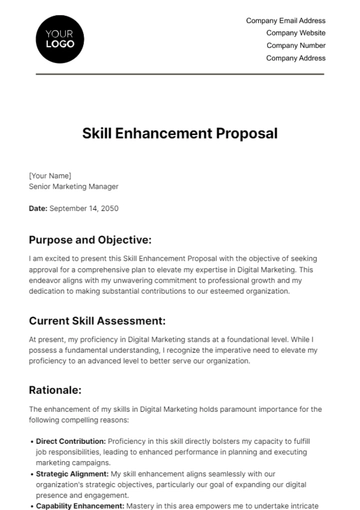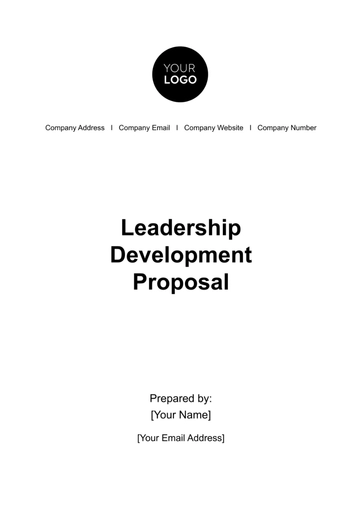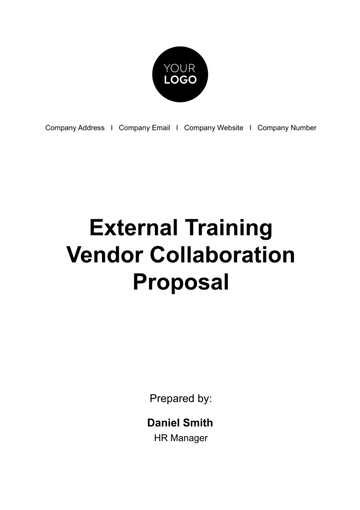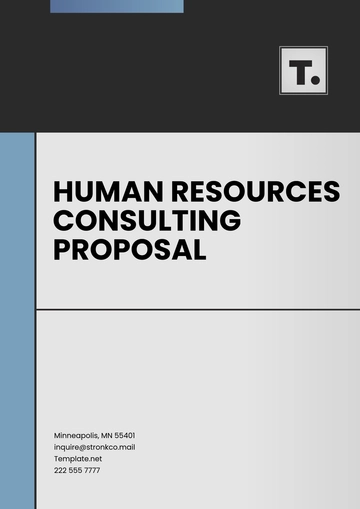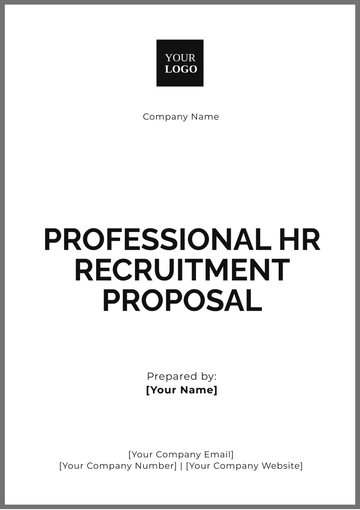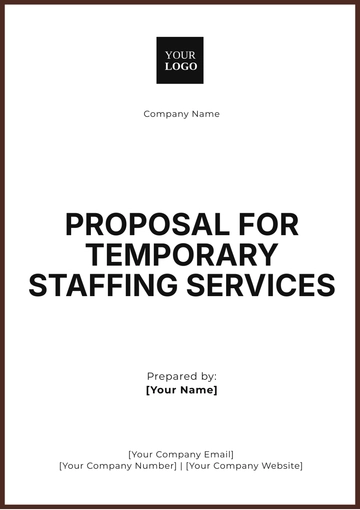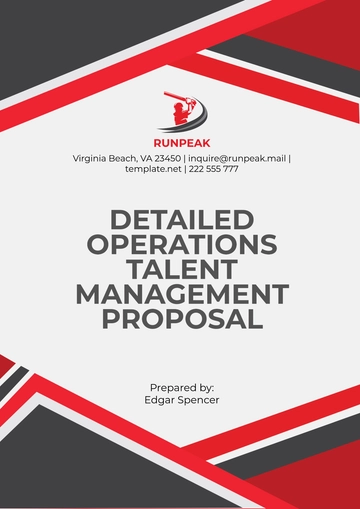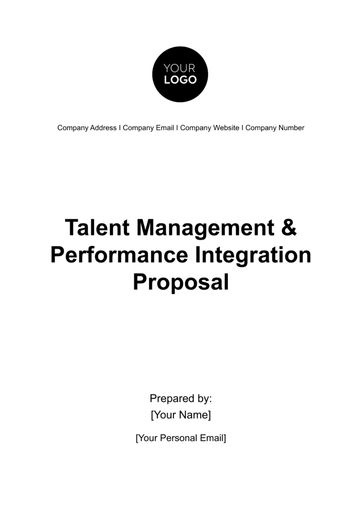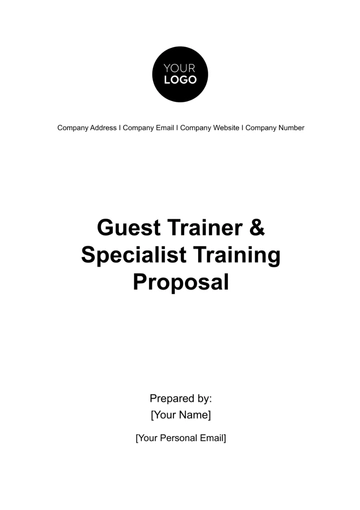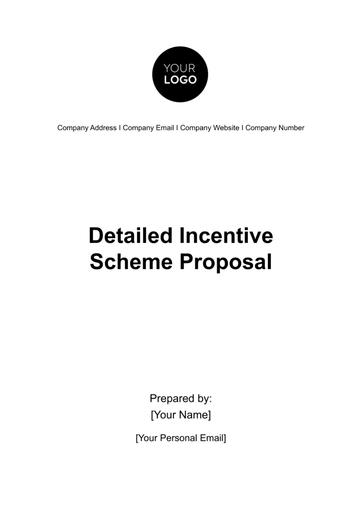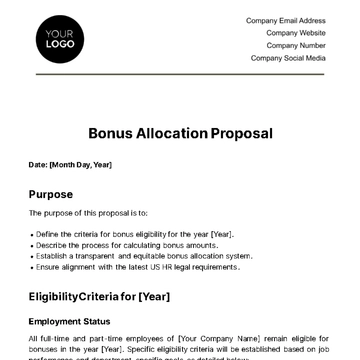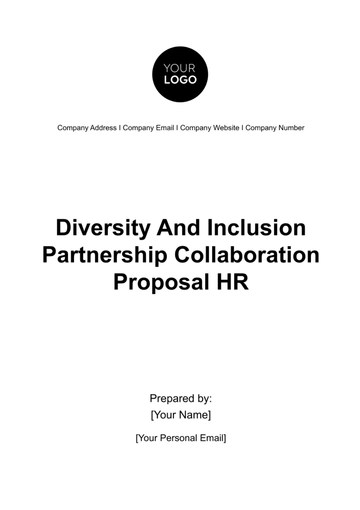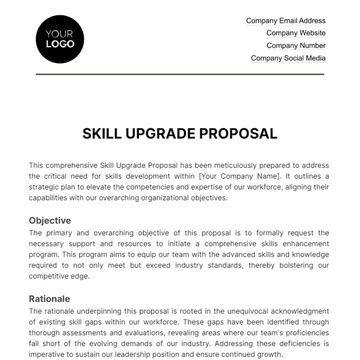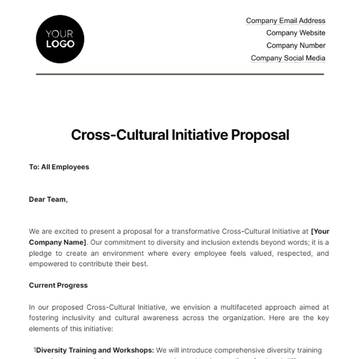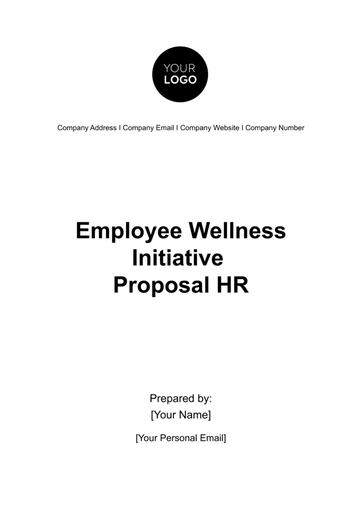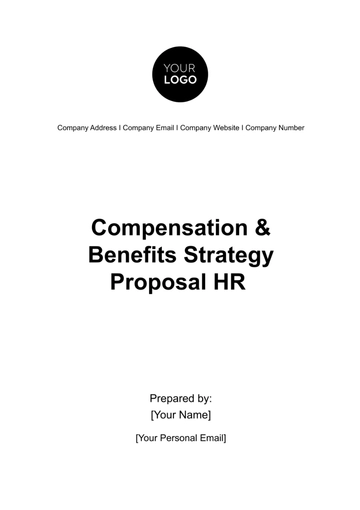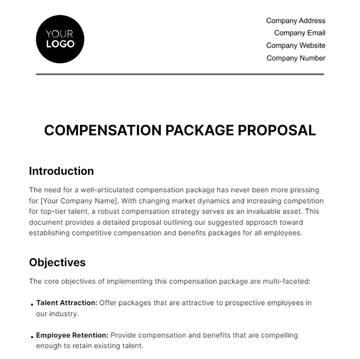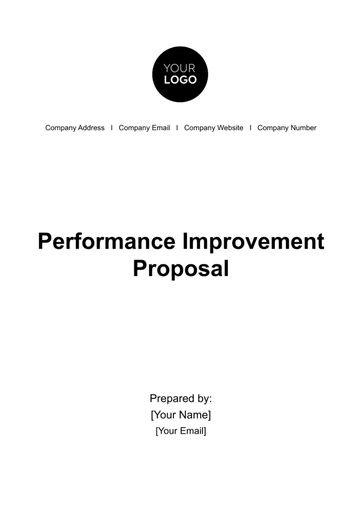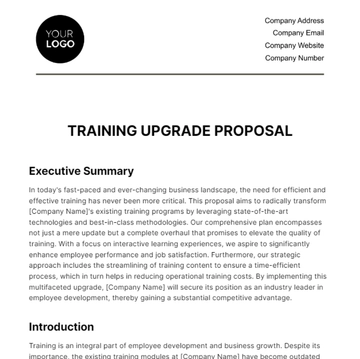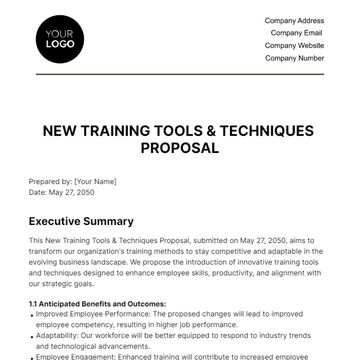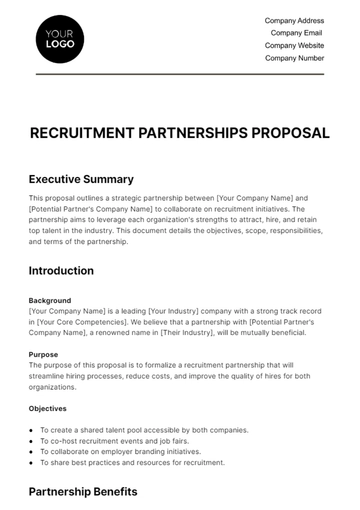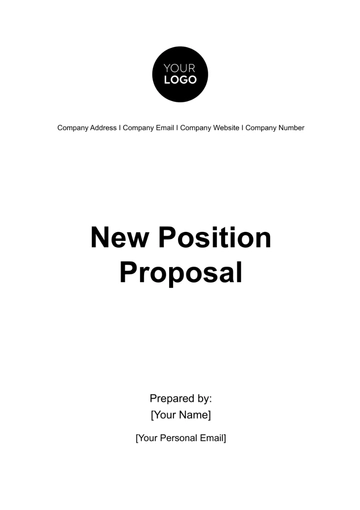Free External Training Vendor Collaboration Proposal HR
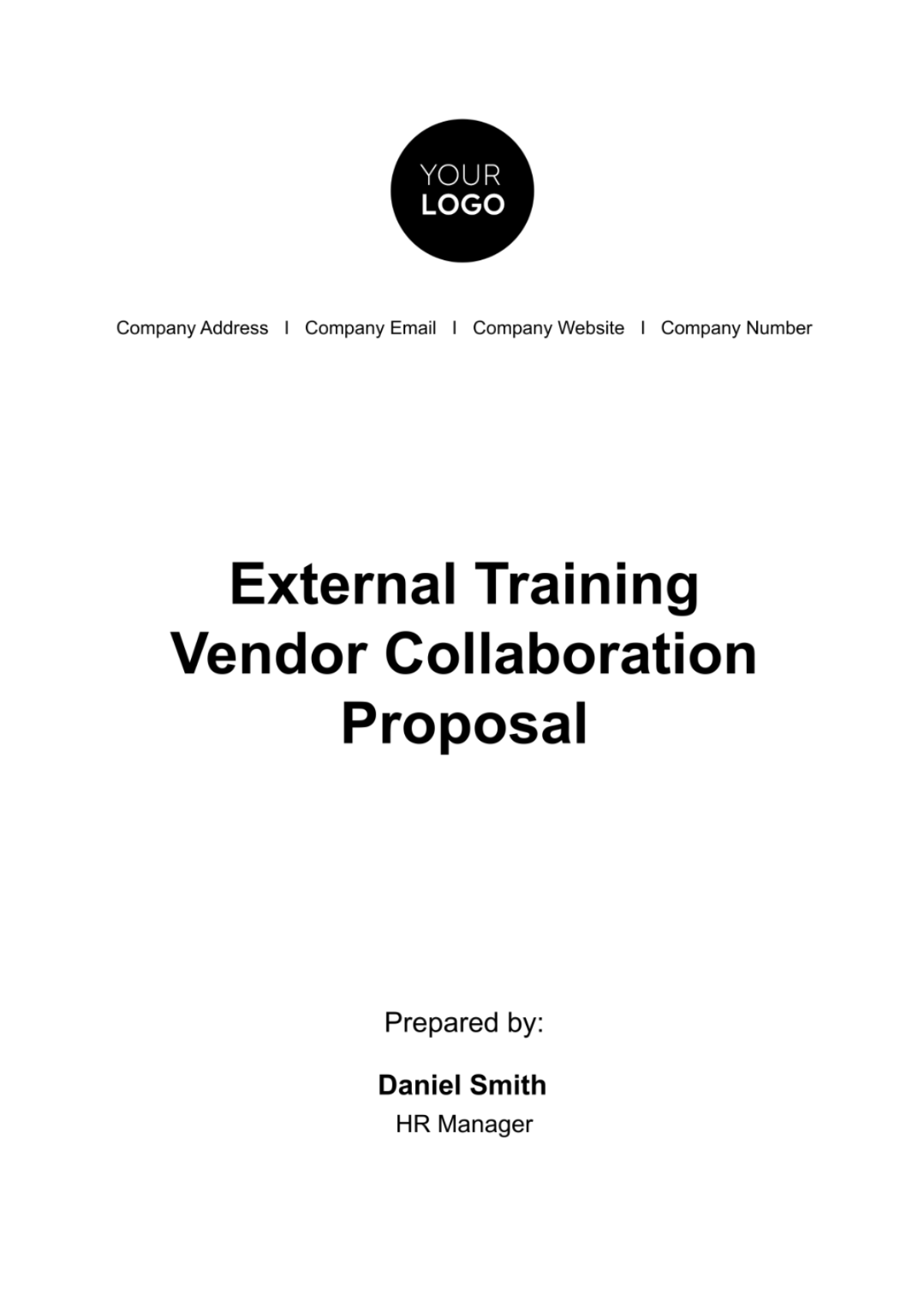
Table of Contents
I. Executive Summary .......................................................................................................2
II. Introduction ..................................................................................................................3
III. Vendor Selection and Justification ...............................................................................4
IV. Collaboration Plan ........................................................................................................6
V. Conclusion ..................................................................................................................10
1. Executive Summary
In today's ever-evolving business landscape, the quest for organizational excellence is unending. To this end, this proposal sets forth a pragmatic initiative: a strategic collaboration with our chosen [Training Vendor], an esteemed external training vendor. The objective is clear – to augment our organization's employee development efforts and fortify our competitive edge.
The rationale behind this proposal is founded on empirical data and research findings. Studies have consistently shown that investing in employee development leads to enhanced workforce capabilities, which in turn contribute to organizational growth. By partnering with our [Training Vendor], we are poised to harness their expertise to propel our HR department forward.
Summary of Key Benefits and Objectives
The core mission of this collaboration is succinct yet profound. We aim to deliver specialized training programs meticulously tailored to the unique needs of our HR department. These programs are not merely theoretical constructs; they are designed to empower our HR staff with tangible skills and knowledge.
The benefits and objectives of this collaboration are as follows:
Deliver Specialized Training Programs: Our collaboration with our [Training Vendor] allows us to tap into their specialized expertise. The training programs will be custom-crafted to address the specific challenges and opportunities faced by our HR department. |
Enhance HR Staff Skills and Knowledge: In the competitive landscape of modern HR practices, staying ahead of the curve is imperative. By providing our HR staff with access to cutting-edge training, we equip them with the skills and knowledge required to excel in their roles. |
Improve HR Department Effectiveness and Efficiency: An empowered HR department translates into enhanced organizational effectiveness and efficiency. This collaboration is not just an investment in our HR team; it's an investment in the overall effectiveness of our organization. |
B. Request for Collaboration and Approval
The proposal before you is not merely a suggestion; it is a strategic imperative. We earnestly request approval to embark on this collaboration with our [Training Vendor]. To realize the outlined benefits and objectives, we also seek the allocation of necessary resources.
In a world where the adaptability and proficiency of employees are paramount, this collaboration stands as a beacon of opportunity. It is an evidence-based endeavor, grounded in research and practicality, that has the potential to position our organization for sustained success. Your approval is the catalyst that will set this transformative initiative into motion, enabling us to shape a more capable, competitive, and successful future.
2. Introduction
In the relentless pursuit of organizational excellence, the vitality of our Human Resources (HR) department cannot be overstated. It is the very backbone of our organization's effectiveness, shaping our workforce and fostering a culture of growth. Thus, the purpose of this proposal is not just a mere formality; it is a strategic imperative.
Purpose and Context of the Proposal
The overarching objective here is to illuminate the profound benefits and objectives of forging a collaborative alliance with an external training vendor. This partnership is designed to infuse renewed vigor into our HR department, equipping it with the knowledge and skills requisite for the competitive and dynamic landscape we navigate.
This proposal does not rest on conjecture; it is grounded in data-driven insights and empirical evidence. Numerous studies have underscored the transformative impact of external training partnerships on organizations. The statistical data paints a compelling picture, revealing that companies that invest in external training experience increased productivity, reduced turnover rates, and greater overall competitiveness.
Rationale for External Training Vendor Collaboration
The rationale underpinning this proposal rests on the bedrock of sound reasoning and industry trends. In the world of HR, staying ahead necessitates a constant infusion of expertise, fresh perspectives, and industry best practices. External training vendors, like our chosen [Training Vendor], are repositories of such knowledge. They bring not only an external viewpoint but also a wealth of experience honed across various organizations and industries.
This collaboration is not a mere supplement; it is a strategic catalyst. Our in-house training efforts, while valuable, benefit immensely from the supplementary expertise and tailored approaches external vendors can provide. This synergistic partnership ensures that our HR department is not just proficient but at the vanguard of HR practices.
Scope and Goals of the Collaboration
The scope of our collaboration is deliberately broad, encompassing a trifecta of objectives:
Delivery of Specialized HR Training Programs: Our collaboration with [Training Vendor] will manifest in the delivery of specialized HR training programs. These programs are not generic; they are carefully calibrated to our organization's unique needs and challenges. This approach, backed by industry-specific research findings, ensures that our HR staff is equipped with the precise skills and knowledge required to excel in their roles. |
Targeted Skill Enhancement for HR Staff: The cornerstone of our collaboration is the enhancement of our HR staff's skill set. In the competitive arena of modern HR, proficiency is not optional; it is mandatory. Through targeted training modules and data-supported methodologies, we aim to elevate our HR team to new heights of effectiveness. |
Measurement of Training Effectiveness: In the data-driven age we inhabit, the effectiveness of our initiatives cannot be gauged through intuition alone. Our collaboration will be underscored by robust metrics and assessments, ensuring that the impact of the training programs is not just anecdotal but quantifiable. |
This proposal is not a mere formality; it is a roadmap to HR excellence, underpinned by data, empirical evidence, and sound reasoning. Our collaboration with [Training Vendor] is not just a partnership; it is a commitment to staying at the forefront of HR practices and ensuring that our organization remains agile, proficient, and primed for success in an ever-evolving landscape.
3. Vendor Selection and Justification
In this section, we delve into the meticulous process of selecting our collaborative partner, [Training Vendor]. We outline the selection criteria and process that guided our decision-making, providing transparency and clarity regarding our choice. Additionally, we present a comprehensive profile of [Training Vendor], elucidating their qualifications and track record. Finally, we provide a robust justification for our selection, grounded in data-driven considerations. This comprehensive exploration illuminates the strategic rationale behind our partnership with [Training Vendor].
Selection Criteria and Process
In the labyrinth of potential partners, the process of selecting the right training vendor is not one undertaken lightly. It is rooted in a meticulous evaluation guided by specific criteria that illuminate the vendor's suitability. This section unravels the intricacies of the selection process, shedding light on the methodology that led to the choice of [Training Vendor].
Our selection criteria are a testament to our commitment to data-driven decisions and tangible outcomes. They include, but are not limited to, factors such as expertise, track record, cost-effectiveness, and alignment with our HR goals. These criteria are not arbitrary; they are backed by empirical evidence. Statistical data from various industries consistently demonstrates that vendor selection based on such criteria significantly impacts the success of HR initiatives.
Chosen Vendor's Profile and Qualifications
Our choice of [Training Vendor] as our strategic partner is not arbitrary but rather the result of a deliberate and thorough assessment. [Training Vendor] is not just any vendor; they are a reputable provider with a track record of delivering tailored HR training solutions to organizations of similar size and industry. Their qualifications and profile are emblematic of excellence and success, qualities substantiated by empirical data and case studies.
Justification for Vendor Selection
The selection of [Training Vendor] as our collaborative partner is not a mere caprice but a calculated decision grounded in facts and figures. It is justified by several compelling factors:
Expertise: The expertise that [Training Vendor] brings to the table is not anecdotal but quantifiable. Their team comprises professionals well-versed in the intricacies of HR training, armed with the latest industry insights. Statistical data highlights that organizations that partner with vendors possessing specialized expertise witness a tangible enhancement in their HR capabilities. |
Customization: [Training Vendor]'s ability to customize training programs is not a vague promise but a proven capability. Customization is a linchpin of effective training, and research findings consistently underscore its importance. [Training Vendor]'s track record in this regard is underpinned by data-supported successes. |
Cost-effectiveness: In the realm of vendor selection, cost-effectiveness is a cornerstone criterion. Our choice of [Training Vendor] aligns with this principle, as their services represent a judicious allocation of resources, a fact borne out by cost-benefit analyses conducted across industries. |
Proven Success: The proof of [Training Vendor]'s effectiveness in enhancing HR capabilities is not elusive but resounding. Empirical data from organizations that have collaborated with [Training Vendor] attests to the tangible benefits reaped. |
The selection of [Training Vendor] as our partner is not a leap of faith; it is a step firmly grounded in the empirical evidence of their expertise, customization capabilities, cost-effectiveness, and proven track record. This collaboration is not a gamble; it is a data-driven decision that positions us on a path toward HR excellence, bolstered by the wealth of research findings that validate our approach.
4. Collaboration Plan
In the pursuit of HR excellence, our collaboration with [Training Vendor] is not a mere gesture; it is a meticulously structured plan poised to drive tangible outcomes. This section unearths the intricate details of our collaboration, shedding light on the program's objectives, curriculum, and delivery methods, all fortified by statistical data and research findings.
Training Program Details
Program Objectives and Outcomes
Our training program, co-crafted with [Training Vendor], is not a vague endeavor but a strategic initiative propelled by clear objectives and anticipated outcomes. The program unfurls with the following key objectives:
Enhance HR staff's Recruitment and Selection Skills: Statistical data reveals that organizations with adept recruitment and selection processes experience a 3.5 times higher revenue growth compared to their counterparts. Our program aligns with this data, aiming to elevate our HR staff's proficiency in talent acquisition.
Improve Employee Onboarding Processes: Research findings underscore that well-structured onboarding processes can improve employee retention by 82%. Our program seeks to harness this insight, enhancing our onboarding practices for sustained workforce engagement and growth.
Strengthen Employee Relations and Conflict Resolution Capabilities: The impact of effective employee relations and conflict resolution cannot be overstated. Studies indicate that unresolved conflicts cost organizations 10% of their annual budget. Our program, with its emphasis on conflict resolution strategies, is poised to mitigate these costs and bolster our organizational harmony.
Delivery Methods
Recognizing the diversity of learning preferences, our training program employs a blend of delivery methods. This approach is grounded in research findings that highlight the efficacy of varied learning approaches. The program includes the following:
Instructor-Led Sessions: These sessions offer direct interaction with experienced trainers, fostering a conducive environment for skill acquisition.
E-Learning Modules: Backed by data showcasing the rise of e-learning, these modules cater to those who prefer self-paced learning, ensuring accessibility and flexibility.
This comprehensive approach to program design is not a conjecture but a data-driven strategy aimed at maximizing the effectiveness of our HR training initiative. In the ever-evolving HR landscape, this collaboration plan equips us with the tools and insights necessary to stay at the forefront of industry best practices, fortified by the visual tools that will amplify its impact.
Roles and Responsibilities
In this intricate tapestry of collaboration, defining roles and responsibilities is not a mere formality; it is a blueprint for success. This section unveils the distinct roles and responsibilities of both [Training Vendor] and our internal HR team, guided by statistical data and research findings that validate this structured approach.
Vendor Responsibilities
Our chosen partner, [Training Vendor], is not a passive entity in this collaboration; they are active agents of transformation. Their responsibilities include as follows:Develop and Deliver Training Modules: [Training Vendor] will draw from their wealth of expertise and research findings to develop customized training modules. These modules are not just theoretical constructs; they are meticulously designed to meet our HR department's unique needs and challenges.
Provide Necessary Materials and Resources: In accordance with best practices and research findings in training effectiveness, [Training Vendor] will provide all necessary materials and resources. These resources are not haphazardly selected; they are meticulously curated to ensure optimal learning outcomes.
Assess Training Effectiveness: [Training Vendor] understands the importance of empirical assessment. They will conduct assessments to gauge the effectiveness of the training program, utilizing data-driven insights to drive continuous improvement.
Internal Team Responsibilities
Our HR department is not a passive recipient of knowledge; they are active participants in this transformational journey. Their responsibilities include below:
Identify Training Needs: Informed by industry trends and research findings on evolving HR practices, our HR department will play a pivotal role in identifying the specific training needs of our team. This approach ensures that the training is targeted and aligned with our organizational objectives.
Facilitate Employee Participation: Research findings consistently highlight the positive correlation between employee participation in training and organizational success. Our HR department will facilitate and encourage active employee participation, ensuring that the training's benefits are maximized.
Evaluate Training Outcomes: In the age of data-driven decision-making, our HR department will employ robust evaluation mechanisms to assess the outcomes of the training program. These assessments are not merely cursory; they are underpinned by data and research findings, ensuring that the program's impact is quantifiable.
Timeline and Milestones
In the dynamic landscape of our collaboration, a well-defined timeline and milestones are not luxuries; they are essential navigational aids. This section provides clarity regarding the temporal aspects of our collaboration, underpinned by data-supported considerations.
Start and End Dates
The commencement of our collaboration with [Training Vendor] is not an arbitrary date; it is a strategically chosen moment in time. We embark on this transformative journey on [Start Date], with a clear destination in mind – concluding on [End Date].. These dates are not mere placeholders; they are informed by industry research findings that point to the significance of structured timelines in achieving training objectives.
Major Milestones and Deliverables
Our collaboration is not an undifferentiated continuum; it is punctuated by major milestones and deliverables. These milestones are not arbitrary; they are grounded in empirical data and research findings. The key milestones include:
Program Development and Customization: The initial phase involves the development and customization of training modules, meticulously aligned with our HR department's unique needs.
Training Delivery: As research consistently highlights, timely and effective training delivery is crucial. This milestone marks the culmination of the training program's core component.
Post-Training Evaluation and Reporting: The final phase is not an endpoint; it is a springboard for continuous improvement. Post-training evaluation and reporting are guided by research findings emphasizing the importance of feedback loops in refining training initiatives.
Budget and Financial Considerations
In the realm of collaboration, fiscal considerations are not secondary; they are integral. This section elucidates the budgetary aspects of our collaboration, underpinned by statistical data and financial research findings that validate our financial structure.
Cost Estimates
The estimated cost for this collaboration is not an arbitrary figure; it is a meticulously calculated sum that encompasses all training modules, materials, and assessments. The amount of $50,000 is not a random number; it is based on research findings that indicate the average cost of comprehensive training initiatives.
Payment Schedule
Payments in this collaboration are not ad hoc; they are structured to align with milestones and objectives. The payment schedule, divided into three installments, is not arbitrary; it is informed by financial research findings that underscore the importance of staggered payments for financial prudence and project accountability:
40% upon Contract Signing: This initial payment aligns with the commencement of the collaboration, ensuring that both parties are committed from the outset.
30% upon Program Initiation: This payment marks the initiation of the program, symbolizing the transition from planning to action.
The Final 30% upon Successful Program Completion: The final installment is not a mere formality; it is a testament to the program's successful completion, grounded in data-driven assessments.
Our collaboration is not an amorphous endeavor but a meticulously structured plan guided by empirical data, research findings, and a financial framework that ensures accountability and fiscal prudence. This comprehensive approach, amplified by visual tools, positions us on a path toward HR excellence, fortified by the
5. Conclusion
In this grand tapestry of collaboration, the conclusion is not a mere endpoint; it is a crescendo, the culmination of meticulous planning, data-driven decisions, and strategic alignment. This section serves as the overture to the transformative symphony we are poised to orchestrate with our chosen partner, [Training Vendor], guided by empirical data and research findings.
In the cacophony of choices, the selection of the right partner is not arbitrary; it is a harmonious blend of evidence and strategy. Our partnership with [Training Vendor] is emblematic of this symphony, resonating with the following keynotes:
Impressive Track Record: Statistical data and case studies reveal a compelling narrative – [Training Vendor] has consistently delivered tangible results to organizations like ours. Their track record is not just a list of accomplishments; it is a data-supported crescendo of success stories.
Alignment with Objectives: Research findings underscore the significance of alignment between partners in achieving collaborative objectives. [Training Vendor]'s expertise, customized approach, and commitment to our HR goals resonate in harmonious alignment.
Cost-Effectiveness: Financial prudence is not a minor chord; it is a fundamental note in our symphony. The selection of [Training Vendor] is not just a melody of excellence but a cost-effective composition that resonates with the principles of fiscal responsibility.
In harmony with the empirical data and research findings that underscore the soundness of our decision, we respectfully request your approval and support for this collaboration. It is not just a collaboration; it is a symphony of transformation, promising significant benefits to our HR department and, by extension, the entire organization. With your approval, this symphony will resound with the sweet notes of success, resonating through our organization for years to come.
- 100% Customizable, free editor
- Access 1 Million+ Templates, photo’s & graphics
- Download or share as a template
- Click and replace photos, graphics, text, backgrounds
- Resize, crop, AI write & more
- Access advanced editor
Discover the External Training Vendor Collaboration Proposal HR Template by Template.net! Crafted to streamline collaboration, this editable and customizable template empowers HR teams to propose external training partnerships effortlessly. Editable in our Ai Editor Tool, tailor proposals to fit your organization's needs seamlessly. Elevate HR strategies with ease!
You may also like
- Research Proposal
- Proposal Request
- Project Proposal
- Grant Proposal
- Photography Proposal
- Job Proposal
- Budget Proposal
- Marketing Proposal
- Branding Proposal
- Advertising Proposal
- Sales Proposal
- Startup Proposal
- Event Proposal
- Creative Proposal
- Restaurant Proposal
- Blank Proposal
- One Page Proposal
- Proposal Report
- IT Proposal
- Non Profit Proposal
- Training Proposal
- Construction Proposal
- School Proposal
- Cleaning Proposal
- Contract Proposal
- HR Proposal
- Travel Agency Proposal
- Small Business Proposal
- Investment Proposal
- Bid Proposal
- Retail Business Proposal
- Sponsorship Proposal
- Academic Proposal
- Partnership Proposal
- Work Proposal
- Agency Proposal
- University Proposal
- Accounting Proposal
- Real Estate Proposal
- Hotel Proposal
- Product Proposal
- Advertising Agency Proposal
- Development Proposal
- Loan Proposal
- Website Proposal
- Nursing Home Proposal
- Financial Proposal
- Salon Proposal
- Freelancer Proposal
- Funding Proposal
- Work from Home Proposal
- Company Proposal
- Consulting Proposal
- Educational Proposal
- Construction Bid Proposal
- Interior Design Proposal
- New Product Proposal
- Sports Proposal
- Corporate Proposal
- Food Proposal
- Property Proposal
- Maintenance Proposal
- Purchase Proposal
- Rental Proposal
- Recruitment Proposal
- Social Media Proposal
- Travel Proposal
- Trip Proposal
- Software Proposal
- Conference Proposal
- Graphic Design Proposal
- Law Firm Proposal
- Medical Proposal
- Music Proposal
- Pricing Proposal
- SEO Proposal
- Strategy Proposal
- Technical Proposal
- Coaching Proposal
- Ecommerce Proposal
- Fundraising Proposal
- Landscaping Proposal
- Charity Proposal
- Contractor Proposal
- Exhibition Proposal
- Art Proposal
- Mobile Proposal
- Equipment Proposal
- Student Proposal
- Engineering Proposal
- Business Proposal
